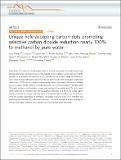Files in this item
Unique hole-accepting carbon-dots promoting selective carbon dioxide reduction nearly 100% to methanol by pure water
Item metadata
| dc.contributor.author | Wang, Yiou | |
| dc.contributor.author | Liu, Xu | |
| dc.contributor.author | Han, Xiaoyu | |
| dc.contributor.author | Godin, Robert | |
| dc.contributor.author | Chen, Jialu | |
| dc.contributor.author | Zhou, Wuzong | |
| dc.contributor.author | Jiang, Chaoran | |
| dc.contributor.author | Thompson, Jamie | |
| dc.contributor.author | Bayazit, Mustafa | |
| dc.contributor.author | Shevlin, Stephen | |
| dc.contributor.author | Durrant, James | |
| dc.contributor.author | Guo, Zhengxiao | |
| dc.contributor.author | Tang, Junwang | |
| dc.date.accessioned | 2020-05-21T10:30:05Z | |
| dc.date.available | 2020-05-21T10:30:05Z | |
| dc.date.issued | 2020-05-21 | |
| dc.identifier | 267587446 | |
| dc.identifier | 3399c4d2-21a6-408f-bb3d-d27a2fbbbfd2 | |
| dc.identifier | 000537066900003 | |
| dc.identifier | 85085154783 | |
| dc.identifier.citation | Wang , Y , Liu , X , Han , X , Godin , R , Chen , J , Zhou , W , Jiang , C , Thompson , J , Bayazit , M , Shevlin , S , Durrant , J , Guo , Z & Tang , J 2020 , ' Unique hole-accepting carbon-dots promoting selective carbon dioxide reduction nearly 100% to methanol by pure water ' , Nature Communications , vol. 11 , 2531 . https://doi.org/10.1038/s41467-020-16227-3 | en |
| dc.identifier.issn | 2041-1723 | |
| dc.identifier.other | ORCID: /0000-0001-9752-7076/work/74509988 | |
| dc.identifier.uri | https://hdl.handle.net/10023/19978 | |
| dc.description | X.L., M.K.B., J.T. acknowledge EPSRC (EP/S018204/2/1), Leverhulme Trust (Grant No: RPG-2017-122) and Newton Advanced Fellowship grant ((NA170422 and NAF\R1\191163).). X.H., Z.X.G. and S.A.S. acknowledge UCL Grace High-Performance Computing Facility (Grace@UCL) and EPSRC (EP/K021192/1, EP/L018330/1). R.G. thanks the FRQNT for postdoctoral funding and NSERC for operational funding. Y.W., J.C. and C.J., acknowledge CSC Scholarship. R.G., J.F.T. and J.R.D. acknowledge ERC AdG Intersolar grant (291482). J.F.T. acknowledges EPSRC CDT (EP/L015277/1). W.Z. thanks EPSRC for Titan Themis S/TEM microscope (EP/L017008/01). We also thank Dr. Jijia Xie for constructive comments on experimental design. | en |
| dc.description.abstract | Solar-driven CO2 reduction by abundant water to alcohols can supply sustainable liquid fuels and alleviate global warming. However, the sluggish water oxidation reaction has been hardly reported to be efficient and selective in CO2 conversion due to fast charge recombination. Here, using transient absorption spectroscopy, we demonstrate that microwave-synthesised carbon-dots (mCD) possess unique hole-accepting nature, prolonging the electron lifetime (t50%) of carbon nitride (CN) by six folds, favouring a six-electron product. mCD-decorated CN stably produces stoichiometric oxygen and methanol from water and CO2 with nearly 100% selectivity to methanol and internal quantum efficiency of 2.1% in the visible region, further confirmed by isotopic labelling. Such mCD rapidly extracts holes from CN and prevents the surface adsorption of methanol, favourably oxidising water over methanol and enhancing the selective CO2 reduction to alcohols. This work provides a unique strategy for efficient and highly selective CO2 reduction by water to high-value chemicals. | |
| dc.format.extent | 9 | |
| dc.format.extent | 1425984 | |
| dc.language.iso | eng | |
| dc.relation.ispartof | Nature Communications | en |
| dc.subject | QD Chemistry | en |
| dc.subject | DAS | en |
| dc.subject.lcc | QD | en |
| dc.title | Unique hole-accepting carbon-dots promoting selective carbon dioxide reduction nearly 100% to methanol by pure water | en |
| dc.type | Journal article | en |
| dc.contributor.institution | University of St Andrews. EaSTCHEM | en |
| dc.contributor.institution | University of St Andrews. School of Chemistry | en |
| dc.identifier.doi | 10.1038/s41467-020-16227-3 | |
| dc.description.status | Peer reviewed | en |
This item appears in the following Collection(s)
Items in the St Andrews Research Repository are protected by copyright, with all rights reserved, unless otherwise indicated.

